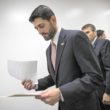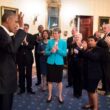Make Wall St. Pay to Play—President Obama’s proposed tax on big Wall Street banks, to recover $117 billion taxpayers lost on the bank bailout, is actually a fee. It’s revenue neutral, sets out to recover a specific amount of money lost in the bailout, and ends in ten years.
In contrast, two hundred economists have signed a letter urging the White House and Congress to impose a permanent tax on financial transactions. Economists Robert Pollin and Dean Baker have crunched the numbers for a paper published by the Washington-based Institute for Policy Studies. Looking at 2008 trading levels, they found that a broad-based tax on trades of stocks and equities, bonds, and other instruments would raise $353.8 billion a year. Assuming that the tax might lower trading volume by discouraging highly speculative trading, the authors also calculated the revenues at 25% ($265.3 billion) and 50% ($176.9 billion) below normal trading volume.
Not only are the markets an enormous revenue source. A financial tax would shift the burden of taxation toward the wealthy, who benefited from the George W. Bush tax cuts. The mean financial holdings of the wealthiest 10 percent of U.S. households is 45 times greater than the mean financial holdings of the bottom 75 percent.
Oregon Democratic Representative Peter DeFazio and Iowa Democratic Senator Tom Harkin are sponsoring a modest transactions-tax bill. In a conference call in early December, Harkin explained the rationale for taxes aimed at Wall Street: “In the first nine months of this year [2009], Goldman Sachs set aside nearly $17 billion, that’s with a ‘B,’ for bonuses and other compensation and is on track to pay its employees an average, an average, of $700,000 this year.”
Harkin gets it right. After being bailed out for reckless practices that caused the greatest financial crisis since the Great Depression, banks are doing quite well. The 38 largest Wall Street financial institutions reported paying out $145.85 billion in salaries and bonuses in 2009, an increase of 18 percent over the previous year and 6 percent above the industry record payout in 2007.
The financial transactions-tax bill is yet another long shot. President Obama liked the idea while campaigning but has moved away from it. Treasury Secretary Tim Geithner says “no” because he’s never seen a situation where a transaction tax worked. Bankers warn ominously that it will drive traders to markets outside the U.S. and destroy American stock exchanges. Yet Great Britain imposes a transactions tax that raises $40 billion a year and the London Stock Exchange remains one of the most robust markets in the world.
Worried about your 401(k)? The DeFazio bill exempts it from the tax bite. I’ve seen no polling, but it’s a safe bet that the public is way ahead of elected officials on the issue of taxing stock transactions.
Why Change is a Challenge—By proposing a tax on the big Wall Street banks, which Republicans will instinctively oppose although public anger at bankers is seething, the Obama administration might have put Congressional Republicans in a box. But real and permanent reform—such as a transactions tax or a return to restrictions that separated bankers from brokers until the Glass-Steagall Act was dismantled in 1989—is daunting. Consider the contributions to the House Financial Services Committee, which took the lead in trying to draft reform legislation that has yet to make it to the floor.
The 71 committee members (42 Democrats, 29 Republicans) have received $77.6 million in career contributions from influence hustlers in banking, real estate, and insurance—the sectors that pushed the global economy to the precipice of financial collapse. This aggregate sum represents everything from $4 million contributed to senior Democratic committee member Paul Kanjorski, who was elected in 1984, to $542,000 brought in by Michigan Democrat Gary Peters, who was elected in 2008. (The half-a-million-plus investment in a member who has yet to complete his first term suggests how quickly money flows to powerful committees.)
The influence buying is bipartisan, almost evenly divided between committee Democrats and Republicans (although Republicans get more cash per capita). The minority has its own $4 million man, Alabama Representative Spencer Bachus, a fierce opponent of even the most minor reform measures. If this were a jury, most committee members would have been stricken for cause because of conflicts of interest. (Contribution reports provided by OpenSecrets.org.)






0 Comments